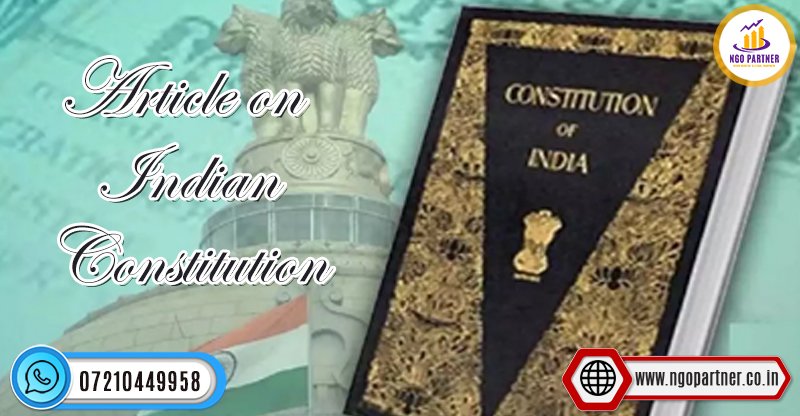
- June 13, 2023
- NGO Partner
- 0 Comments
- 1178 Views
- 0 Likes
- Marketing Company Blogs
The Indian Constitution: Cornerstone of Democracy
The Indian Constitution
In the tapestry of India’s vibrant democracy, one thread stands out as the cornerstone of our nation’s governance and values – the Indian Constitution. Like a guiding compass, it has played a pivotal role in shaping the democratic framework of our country. From safeguarding fundamental rights to establishing the structure of government, the Indian Constitution has laid the foundation for a just and inclusive society.

With its inception rooted in a historical context, the process of drafting the Indian Constitution was an extraordinary feat. After gaining independence from British rule, India embarked on a remarkable journey to define its own destiny. Visionaries and scholars from diverse backgrounds came together to shape a document that would reflect the aspirations and ideals of a newly independent nation.
Amidst numerous deliberations, debates, and compromises, the Constituent Assembly meticulously crafted the Indian Constitution, which was adopted on 26th January 1950, marking the birth of a sovereign democratic republic. This momentous occasion symbolized the triumph of the people’s will, enshrining principles that would guide the nation’s future.
In this blog post, we will delve into the significance and key elements of the Indian Constitution. We will explore its foundational principles, the structure of government it establishes, the fundamental rights it guarantees, and the directive principles that guide the state’s policies. We will also touch upon the dynamic nature of the Constitution, allowing for amendments and adaptations to suit the changing needs of our society.
Foundational Principles of Indian Constitution
The Indian Constitution stands on the pillars of foundational principles that shape the governance and functioning of our nation. Sovereignty, secularism, socialism, and democratic republic are the cornerstones that lay the groundwork for a just and inclusive society.
Sovereignty, or the supreme power of the people, signifies that the authority to govern lies with the citizens of India. It ensures that decisions are made in the best interest of the people and that their will is respected. Secularism, another fundamental principle, guarantees the freedom to practice and propagate any religion while maintaining the neutrality of the state in religious matters. It promotes religious harmony, tolerance, and respect for all faiths.
Socialism reflects the commitment of the Indian Constitution to achieve social and economic justice. It aims to bridge the gap between the privileged and the marginalized, ensuring equitable distribution of resources and opportunities. This principle guides policies that uplift the disadvantaged sections of society and foster inclusive growth.
The Indian Constitution also establishes India as a democratic republic, emphasizing the power vested in the hands of the people. Democracy ensures that citizens have the right to elect their representatives, participate in decision-making processes, and hold those in power accountable. It promotes equality, freedom, and the rule of law, ensuring a government of the people, by the people, and for the people.
Fundamental Rights and Duties
The Indian Constitution guarantees fundamental rights to its citizens, safeguarding their individual liberties and protecting them from any form of infringement. These rights include the right to equality, freedom of speech and expression, right to religion, right to life and personal liberty, and several others. These rights empower individuals and ensure their dignity, autonomy, and participation in society.
Alongside fundamental rights, the Indian Constitution also emphasizes fundamental duties. These duties serve as a moral compass, guiding citizens to be responsible and active participants in nation-building. They include respecting the national flag, preserving the rich heritage of the country, promoting harmony, and upholding the ideals of the Constitution. Fundamental duties remind us of our collective responsibility in maintaining the integrity and well-being of our nation.
Structure of Government
The structure of government in India is based on the principles of separation of powers and a system of checks and balances. It comprises three main branches: the executive, the legislature, and the judiciary.
The executive branch is responsible for implementing laws and policies. It consists of the President, the Vice President, and the Council of Ministers headed by the Prime Minister. The executive branch ensures the smooth functioning of the government and the implementation of decisions made by the legislature.
The legislature, known as the Parliament, is responsible for making laws. It consists of two houses: the Lok Sabha (House of the People) and the Rajya Sabha (Council of States). The Parliament debates and discusses issues, passes laws, and represents the voice of the people.
The judiciary is the guardian of justice and the interpreter of the Constitution. It ensures that laws are in accordance with the Constitution and safeguards the rights and liberties of individuals. The Supreme Court of India, along with various high courts and subordinate courts, forms the judicial system, providing justice to citizens and resolving disputes.
The separation of powers among these three branches prevents the concentration of power and ensures a system of checks and balances. This mechanism guarantees accountability, transparency, and the protection of citizens’ rights.
Directive Principles of State Policy
The directive principles of state policy form an integral part of the Indian Constitution and serve as guiding principles for the government in formulating socio-economic policies. While fundamental rights are enforceable, the directive principles provide a roadmap for achieving social justice, equality, and overall welfare of the society.
These principles cover a wide range of areas, including equitable distribution of resources, promotion of education, healthcare, and social security, protection of the environment, and the upliftment of marginalized sections of society. They emphasize the responsibility of the state in creating conditions for the overall development and well-being of its citizens.
The directive principles strike a balance between individual rights and collective responsibilities. They recognize that rights must be exercised in a manner that contributes to the common good and welfare of society as a whole. By addressing social and economic inequalities, the directive principles aim to create a just and inclusive society.
Amendments and Evolution
The Indian Constitution is a living document that has provisions for amendments to meet the changing needs of society. The amendment process allows for modifications to various aspects of the Constitution while maintaining its core values and principles.
Notable amendments have shaped the Indian society in significant ways. For example, the 73rd and 74th Amendments introduced the concept of local self-governance, empowering grassroots democracy and promoting decentralization. The amendment related to reservations for backward classes has played a crucial role in promoting social equity and inclusivity. These amendments reflect the evolving needs and aspirations of the Indian society.
The ability to adapt and evolve with changing times is one of the strengths of the Indian Constitution. It ensures that the Constitution remains relevant and responsive to the challenges and aspirations of a dynamic and diverse nation.
Role of Judiciary
The judiciary plays a pivotal role in interpreting and upholding the Indian Constitution. It acts as the guardian of the Constitution and ensures that the principles and rights enshrined in it are protected.
One of the significant powers of the judiciary is judicial review. It enables the courts to review the constitutionality of laws and executive actions. Judicial review ensures that the government functions within the limits of the Constitution and acts as a check on arbitrary exercise of power.
The judiciary’s role in upholding the Constitution is essential for maintaining constitutional governance, protecting individual rights, and ensuring the rule of law. It acts as a safeguard against any violation of the fundamental principles and rights guaranteed by the Indian Constitution.
Through the directive principles of state policy, the process of amendments, and the role of the judiciary, the Indian Constitution demonstrates its adaptability, resilience, and commitment to justice and equality. It serves as the bedrock of our democratic framework, guiding the nation towards progress and inclusive development.
Conclusion
The Indian Constitution stands as a testament to the aspirations and values of a diverse nation. In this blog post, we explored its foundational principles, fundamental rights, structure of government, directive principles of state policy, the process of amendments, and the role of the judiciary. Through its provisions, the Constitution empowers citizens, ensures equality, and sets the stage for a just and inclusive society. It is our collective responsibility to understand and appreciate the Indian Constitution as the cornerstone of our democracy. Let us uphold its principles, protect citizens’ rights, and work towards a society that embodies the ideals enshrined in this remarkable document.




Leave a Comment